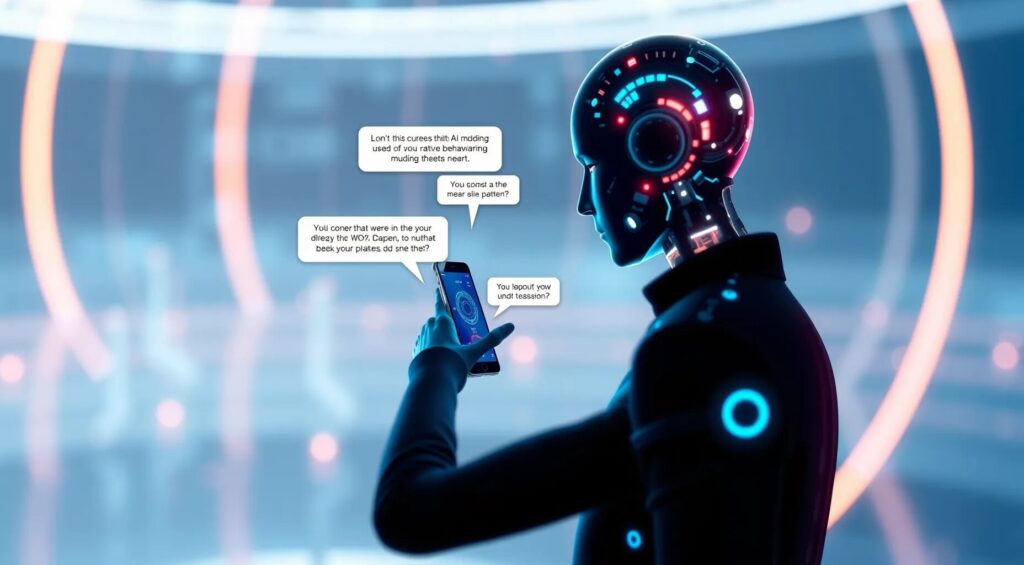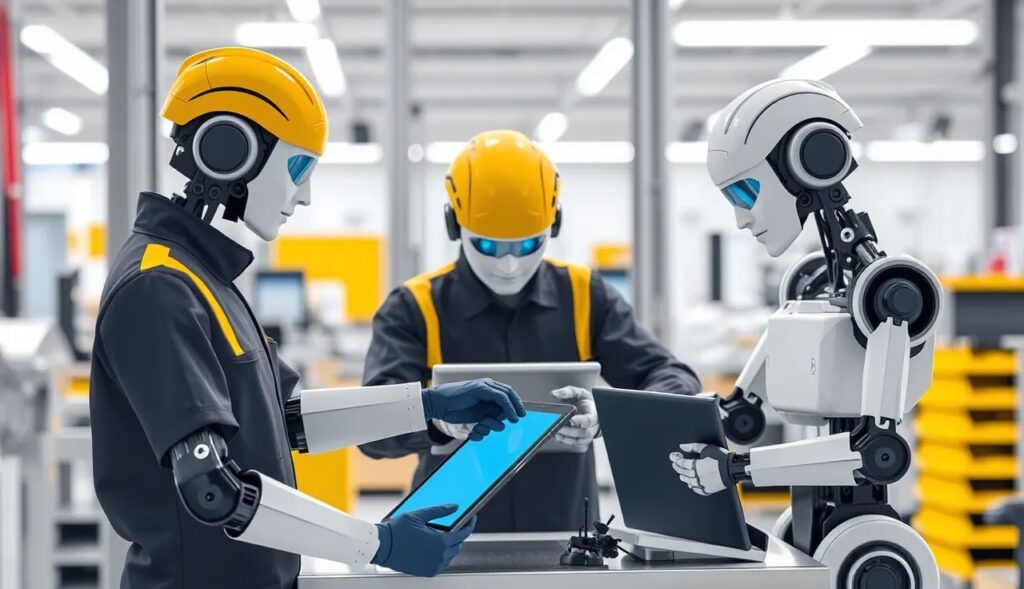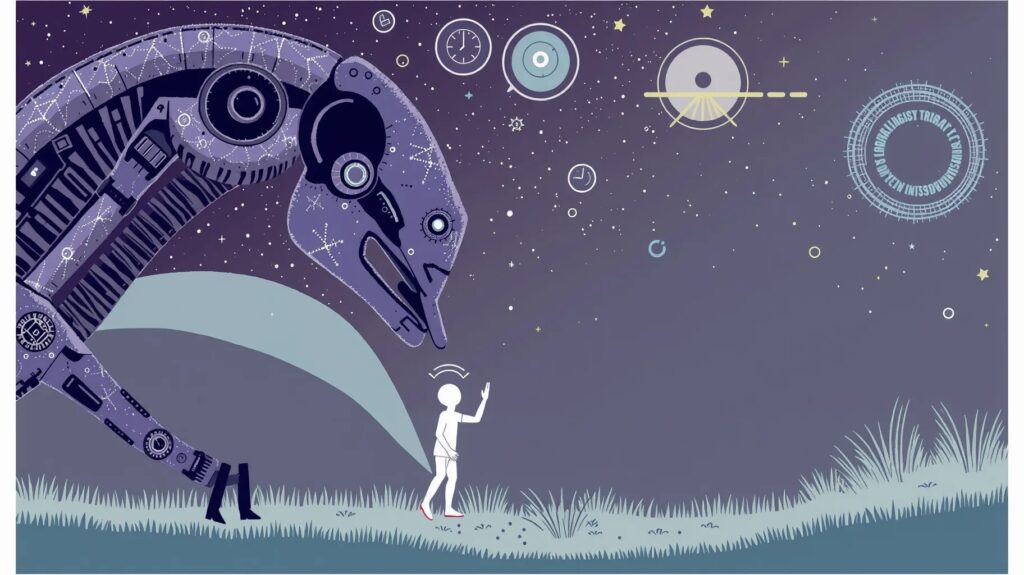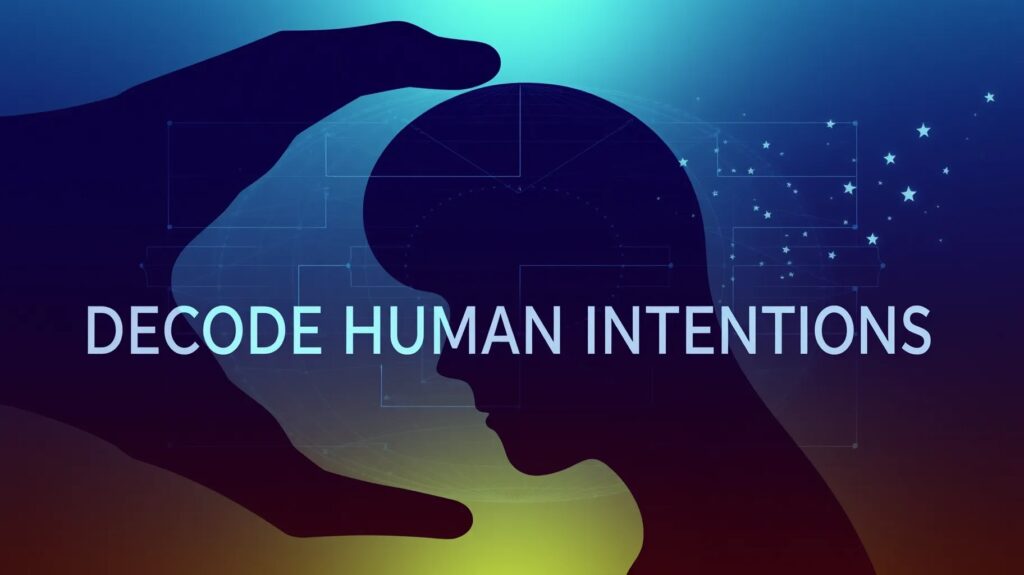
The Fascination with Chaos and Decision-Making
What is Game Theory?
Game theory explores how individuals or groups make decisions in competitive or cooperative settings. By studying strategies, outcomes, and interactions, it provides tools to predict behaviors, even in chaotic environments.
Chaos, in this context, doesn’t mean randomness. It refers to systems with sensitive dependencies—where small changes lead to significant impacts. Think of stock markets or global pandemics; they operate in a chaotic manner but often follow hidden patterns.
How Chaos Influences Decisions
In a chaotic environment, traditional linear models fail. Human behavior becomes unpredictable, and small choices snowball into massive consequences. Game theory models shine here because they analyze decisions considering uncertainty, incentives, and potential outcomes.
These models can help untangle complex systems like:
- Supply chain disruptions during crises.
- Strategic pricing in volatile markets.
- Conflict resolution under high stakes.

Why Simulations are Key
Simulations amplify game theory’s power. By creating controlled scenarios, they help forecast how real-world systems might behave under stress.
With advanced AI-driven models, you can run countless iterations, uncover hidden strategies, and predict the “what-ifs” with remarkable precision.
Building Blocks of Game Theory Simulations
Key Concepts to Understand
To make sense of game theory simulations, you need to grasp a few critical ideas:
- Players: Individuals or groups with competing or complementary goals.
- Strategies: The set of actions players can choose.
- Payoffs: Outcomes, often in terms of gains or losses.
- Equilibrium: A stable state where no player benefits by changing their strategy alone.
In chaos, the equilibrium often becomes unstable or fragmented, leading to dynamic, ongoing shifts.
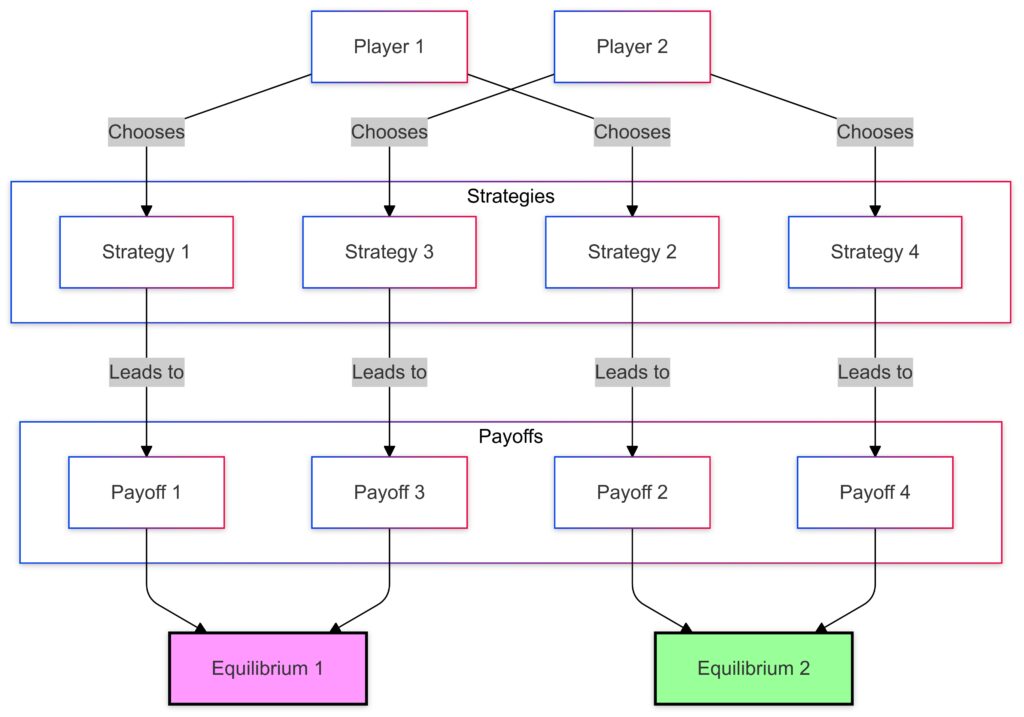
Tools and Techniques Used
Game theory simulations rely on tools like Monte Carlo methods, agent-based modeling, and AI-driven algorithms. These allow researchers to model complex interactions and examine millions of potential outcomes in scenarios such as:
- Climate change negotiations.
- Political election strategies.
- Corporate competition.
Using these tools, patterns emerge that might otherwise stay buried under the noise of chaos.
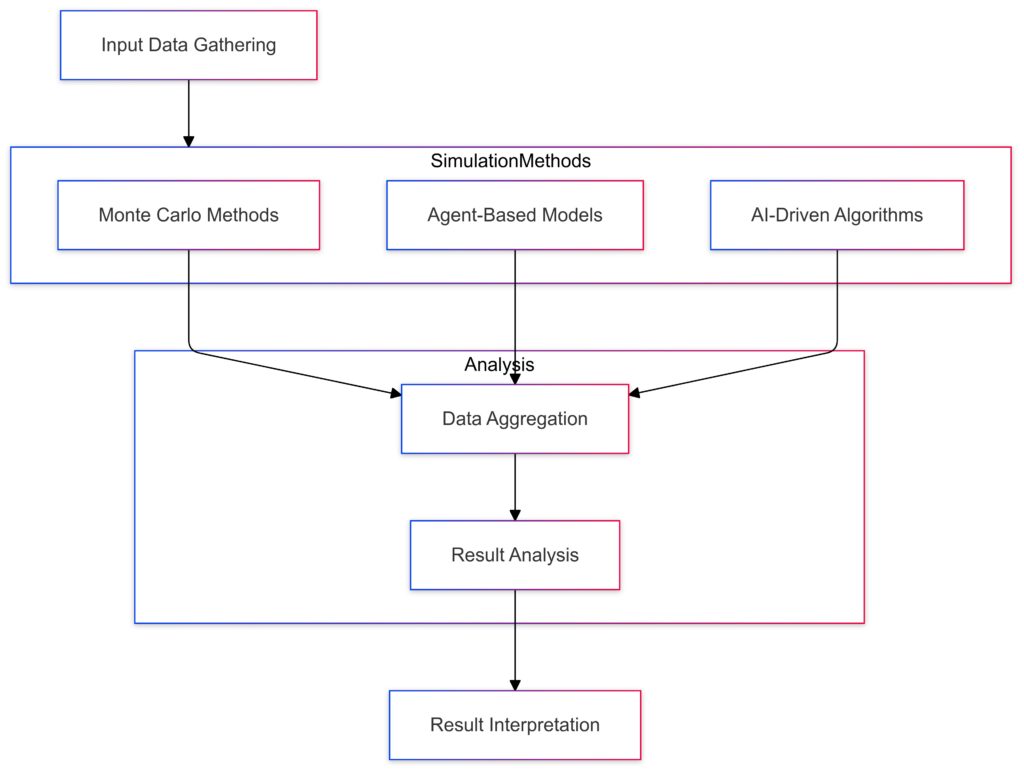
Applications in Real-World Scenarios
Predicting Economic Trends
Game theory has revolutionized economic forecasting, especially in unpredictable markets. Through simulations, analysts can:
- Predict how firms adjust pricing during economic downturns.
- Assess the ripple effects of policy changes on industries.
Example: Predicting how OPEC members respond to fluctuating oil demands during geopolitical unrest.
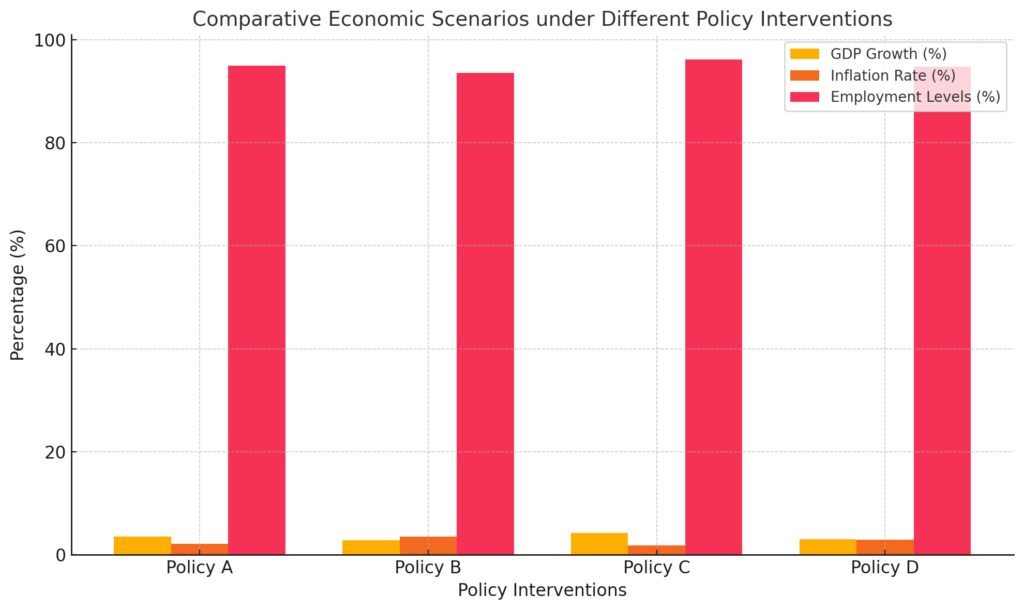
Economic scenarios under different policy interventions, with bars representing GDP growth, inflation rates, and employment levels for each strategy
Navigating Crises and Conflicts
Simulations provide clarity in emergency decision-making. From diplomatic standoffs to supply chain crises, game theory helps stakeholders test strategies before committing to risky moves.
Take cybersecurity breaches, for instance. Simulating attacker-defender dynamics can guide companies toward stronger defenses, avoiding catastrophic data losses.
Game Theory Simulations in Technology and AI

Enhancing Machine Learning with Game Theory
Game theory plays a pivotal role in AI and machine learning systems, especially in competitive environments like fraud detection or resource allocation. By simulating scenarios where agents make decisions with limited information, AI learns to adapt and optimize strategies in unpredictable settings.
Multi-agent systems (like self-driving cars or robotic teams) rely heavily on game theory to predict each other’s movements and minimize collisions or inefficiencies.
Example: AI in autonomous trading platforms uses game-theoretic models to outwit competitors and predict market trends during volatility.
Revolutionizing Decision-Making Algorithms
Decision-making algorithms powered by game theory can analyze human behavior under stress. For instance:
- Healthcare triage systems: Simulate resource allocation during pandemics.
- Smart city management: Predict traffic flow and optimize energy usage during natural disasters.
These simulations ensure that algorithms are fair, resilient, and effective even in unpredictable circumstances.
Tackling Cybersecurity Threats
The cybersecurity landscape thrives on chaos, with attackers and defenders in constant evolution. Simulations rooted in game theory provide a framework to anticipate:
- Attack vectors based on known vulnerabilities.
- Defensive strategies that adapt to malicious behavior.
By modeling scenarios where both hackers and systems “play their best moves,” organizations can stay ahead of threats in cyber arms races.
Behavioral Insights Through Simulations
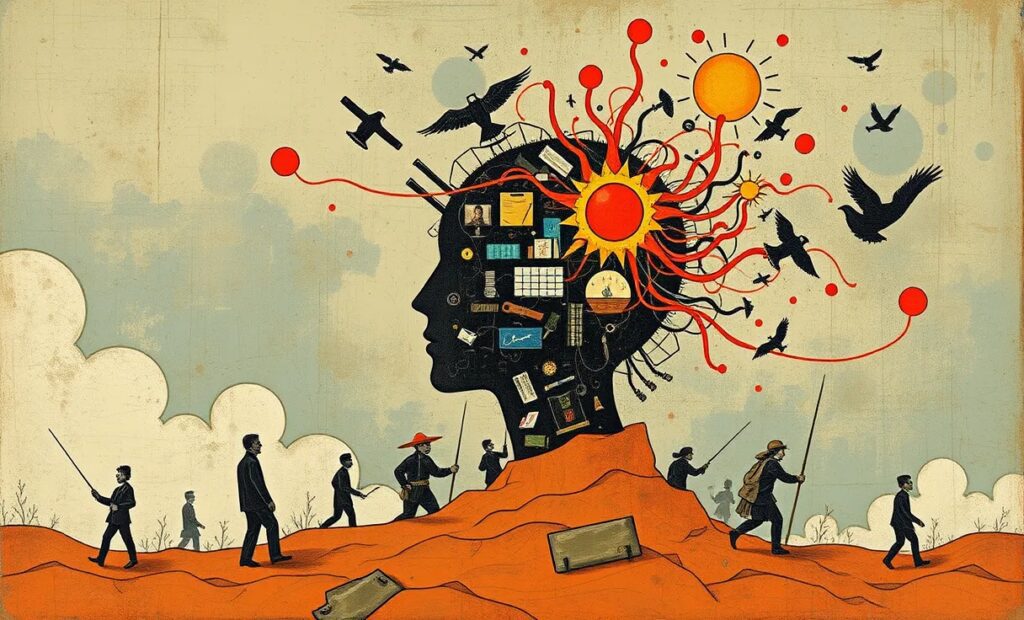
Modeling Human Psychology in Chaos
Game theory simulations don’t just analyze numbers—they dive into human psychology. They study:
- How fear or greed influences financial decisions.
- Why groups form alliances during crises, even when self-interest dominates.
Example: In disaster management, simulations show why communities share resources or, conversely, hoard supplies. These insights guide governments in crafting more effective emergency policies.
Understanding Social Dilemmas
Social dilemmas, where individual interests clash with collective well-being, are ripe for game theory analysis. Consider simulations in these scenarios:
- Climate agreements: Nations must balance economic growth with reducing emissions.
- Pandemic response: People decide whether to vaccinate, balancing personal risk against public health benefits.
By analyzing these decisions, simulations reveal tipping points where cooperation or defection dominates.
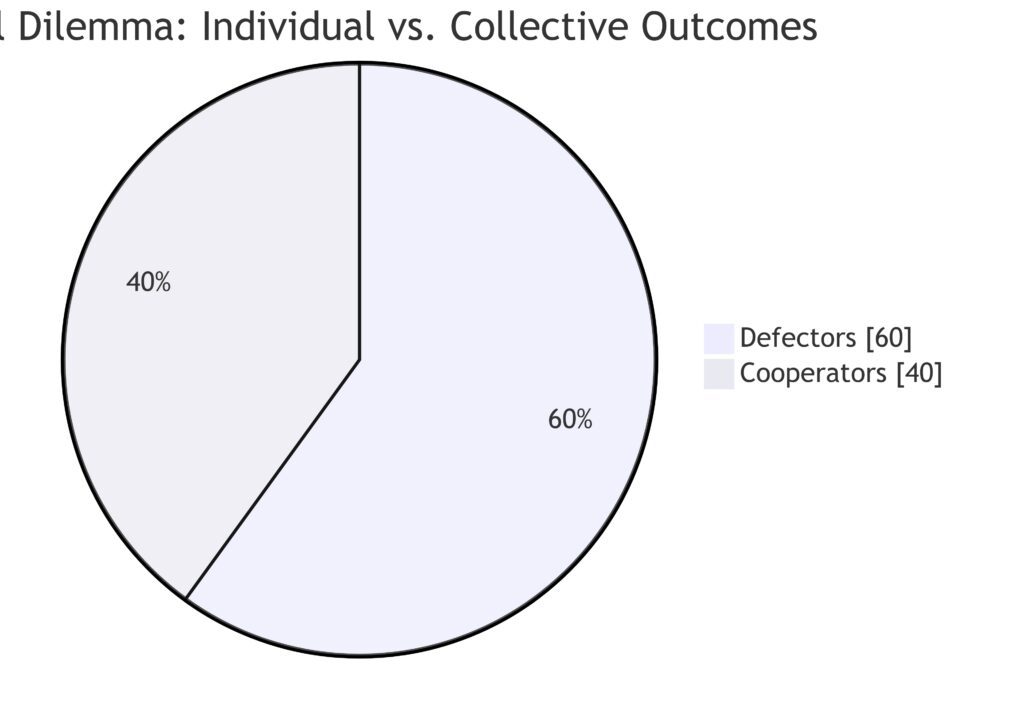
Mapping the dynamics of cooperation and defection in social dilemmas with game theory.
Forecasting Trends in Behavioral Economics
In economics, game theory simulations help untangle how consumers act during uncertainty. For example, they explore:
- Why consumers flock to certain brands during crises.
- How pricing strategies influence perceived value.
This foresight empowers companies to adapt quickly, turning market chaos into opportunity.
Challenges and Limitations

Complexity and Computational Power
While powerful, game theory simulations demand immense computational resources, especially for chaotic systems with countless variables. Balancing accuracy with efficiency remains a critical challenge.
Predictability in Unpredictable Systems
Even with robust models, predictions are probabilities, not certainties. Chaos introduces feedback loops that may render simulations irrelevant if real-world conditions shift too quickly.
Ethical Considerations in Application
When simulations are used in sensitive areas like war strategy or market manipulation, ethical concerns arise.
- Is it ethical to exploit consumer vulnerabilities revealed through game theory?
- Should governments rely on simulations to justify controversial policies?
Addressing these questions ensures game theory evolves responsibly.
Bridging Data Gaps
Accurate simulations require high-quality data. In chaotic scenarios, missing or unreliable data can skew predictions, leading to flawed decisions.
How Businesses Leverage Game Theory Simulations

Strategic Planning in Competitive Markets
Game theory simulations are invaluable in business strategy, especially when competition is fierce. They help organizations anticipate rivals’ moves, optimize their responses, and identify first-mover advantages.
Key Use Cases:
- Pricing wars: Predict competitor pricing changes and prepare counter-strategies.
- Product launches: Simulate market responses to new offerings and adjust rollout strategies.
- Mergers and acquisitions: Forecast rival reactions to consolidation efforts.
Example: Tech giants like Amazon and Google use simulations to refine advertising strategies, analyzing competitors’ ad spends and targeting behaviors.
Supply Chain Optimization
Chaos in supply chains—triggered by geopolitical events or natural disasters—calls for resilient planning. Game theory simulations model disruptions and test strategies to:
- Diversify suppliers without increasing costs.
- Allocate inventory efficiently during shortages.
- Balance long-term contracts with flexible sourcing.
Example: During the COVID-19 pandemic, companies leveraged simulations to reconfigure global supply networks, mitigating the risk of production halts.
Marketing and Consumer Behavior Predictions
Marketing thrives on understanding and influencing consumer psychology. Game theory simulations provide insights into:
- How consumers react to discounts or loyalty programs.
- Optimal pricing strategies during high demand or scarcity.
- Cross-brand loyalty dynamics in chaotic marketplaces.
With this knowledge, businesses can align their strategies to maximize ROI while avoiding alienating their customer base.
Negotiation Tactics
Whether negotiating trade deals, supplier contracts, or corporate partnerships, game theory simulations help businesses:
- Identify leverage points.
- Predict counteroffers.
- Craft proposals that balance risk and reward.
Example: Simulations helped automakers secure favorable contracts with semiconductor suppliers during the global chip shortage.
The Role of Game Theory in Policy Making
Managing Public Health Crises
Game theory has been instrumental in pandemic planning, offering simulations to:
- Model vaccine distribution strategies.
- Anticipate public compliance with health mandates.
- Balance economic and health priorities in reopening decisions.
Example: Policymakers simulated scenarios to predict how mask mandates and vaccine rollouts would affect infection rates and hospital loads.
Climate Change Mitigation
Game theory simulations guide international climate negotiations by modeling how countries balance economic growth with environmental commitments. They reveal:
- Incentives needed to secure cooperation.
- Likely defectors and their motivations.
- The impact of individual countries on global emissions.
Urban Planning and Smart Cities
In chaotic urban environments, simulations predict:
- Traffic patterns and congestion points.
- Energy consumption during extreme weather.
- Public response to policy changes, such as congestion pricing or new public transit systems.
Example: Cities like Singapore use game theory models to design traffic flow systems, balancing public convenience with environmental goals.
Conflict Resolution and Diplomacy
From trade disputes to armed conflicts, simulations test strategies for peacekeeping and negotiation. Policymakers can analyze scenarios to determine:
- The likelihood of escalation.
- The impact of sanctions or incentives.
- How alliances shift under stress.
Example: Simulations during the Cold War helped strategists model nuclear deterrence, ensuring global stability amid uncertainty.
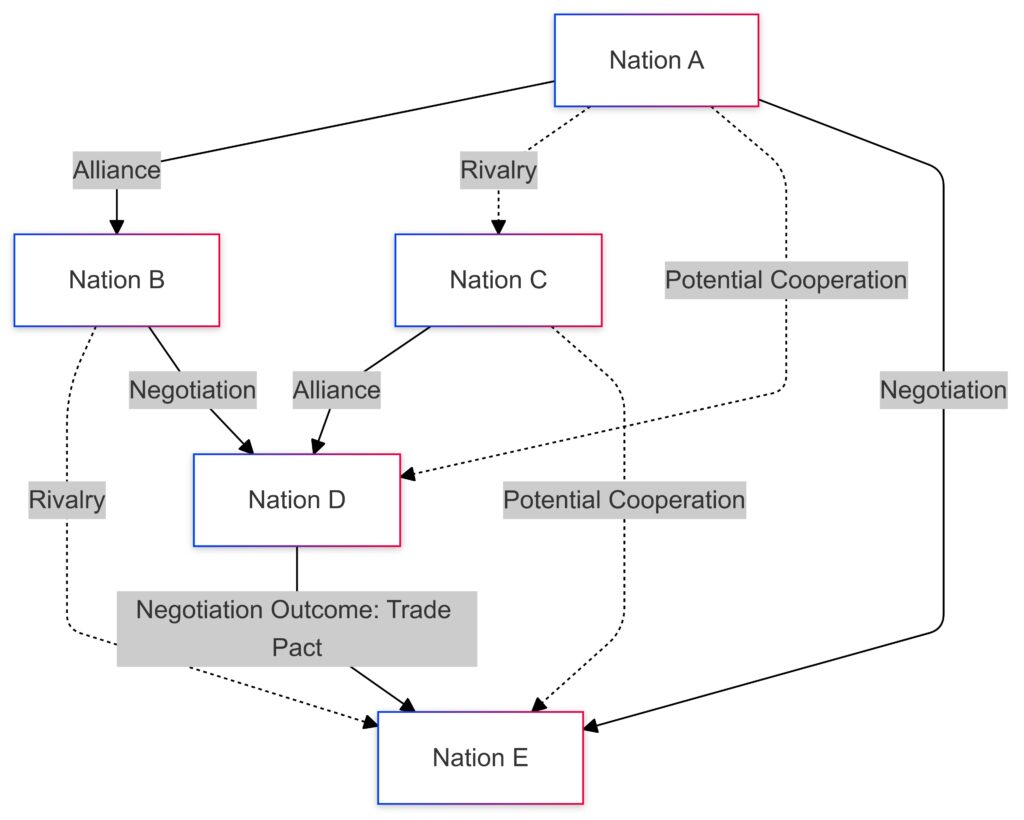
Future Directions for Game Theory Simulations
Integration with AI and Big Data
As technology advances, game theory simulations will grow more sophisticated. AI-driven models will process vast datasets in real time, improving accuracy and scalability.
Expansion into Everyday Decision-Making
Imagine simulations tailored to everyday choices, like personal finance or career planning. With user-friendly interfaces, game theory could help individuals navigate chaos just as effectively as corporations and governments.
Ethical Guidelines for Fair Use
To ensure responsible applications, ethical frameworks must evolve alongside game theory. Transparency in data usage and accountability in decision-making will be crucial in shaping its future.
In an increasingly chaotic world, game theory simulations offer a roadmap through the noise. From boardrooms to battlefields, their potential to predict and navigate chaos is unparalleled.
FAQs
Can individuals use game theory simulations?
Yes, individuals can apply simplified versions of game theory to everyday decisions, such as financial planning or negotiation tactics.
For example, a freelancer negotiating rates with clients might use basic game theory principles to anticipate counteroffers and secure better terms. Apps and tools increasingly incorporate such models to make them accessible.
Are game theory simulations reliable during extreme uncertainty?
Simulations are not infallible but are valuable tools for managing uncertainty. They provide insights into possible outcomes rather than guaranteed predictions.
For example, during the 2008 financial crisis, game theory simulations helped central banks predict how bailouts would affect interbank lending, guiding effective interventions.
How does AI improve game theory simulations?
AI enhances simulations by processing massive datasets quickly and identifying hidden patterns. It enables real-time updates and more precise modeling of complex scenarios.
For instance, AI-driven simulations in e-commerce predict how competitor pricing and consumer trends will shift during holiday sales, helping businesses optimize their strategies.
Can game theory simulations solve global issues like climate change?
While they can’t solve global challenges outright, they are critical tools for fostering cooperation and identifying feasible strategies.
For example, in international climate negotiations, simulations can show how different incentive structures might lead to collective action or defection, guiding agreements like the Paris Accord.
Game theory simulations are an evolving, adaptable tool. Whether you’re managing a crisis, planning a strategy, or simply curious, their potential to predict and navigate chaos is profound.
How accessible are game theory simulations for small businesses?
Game theory simulations are increasingly accessible to small businesses, thanks to affordable software and user-friendly interfaces. These tools allow smaller organizations to leverage predictive insights without needing extensive technical expertise.
For example, a small retail business can use simulation software to anticipate competitor discounts during holiday sales and adjust its pricing strategy in real-time to stay competitive.
What role does data quality play in the effectiveness of these simulations?
High-quality, accurate data is the cornerstone of reliable simulations. In chaotic scenarios, poor data can lead to skewed predictions and flawed decisions.
For instance, a logistics company might simulate supply chain disruptions based on outdated shipping data, leading to overstocking or stockouts. Investing in robust data collection and analysis ensures that simulations are as effective as possible.
How are game theory simulations applied in education?
Educators use these simulations to teach critical thinking, decision-making, and strategic problem-solving. Students engage in interactive scenarios to understand complex systems and their dynamics.
For example, a business school might simulate a trade negotiation where students represent countries with conflicting interests. This hands-on approach helps learners grasp the nuances of real-world challenges.
Are there risks to relying too heavily on simulations?
Yes, over-reliance on simulations can lead to rigid decision-making and overconfidence in modeled outcomes. Simulations are tools to guide decisions, not replace human judgment.
For instance, a company might overly trust a market trend predicted by simulations, ignoring emerging data that signals a shift in consumer behavior. Balancing simulation insights with ongoing analysis is crucial.
Can simulations address behavioral unpredictability in humans?
Game theory simulations excel at modeling incentives and probable actions, but they cannot fully capture irrational or highly emotional behaviors.
For example, during the 2008 financial crisis, some individuals made irrational decisions out of fear, such as withdrawing large sums from banks. While simulations provided overall trends, these unpredictable actions added layers of complexity to predictions.
How do simulations account for multiple stakeholders with competing goals?
Simulations model interactions between stakeholders by assigning each “player” unique goals, strategies, and constraints. This approach helps reveal optimal strategies for cooperation or competition.
For instance, in urban development, simulations can model interactions between governments, developers, and citizens to design policies that balance economic growth with community welfare.
Are there industries where game theory simulations are underutilized?
Certain sectors, like nonprofits and education, have yet to fully tap into the potential of game theory simulations. These industries could benefit from enhanced strategic planning and resource allocation.
For example, a nonprofit could simulate donor behavior to design more effective fundraising campaigns or allocate aid resources more efficiently during natural disasters.
How are simulations improving with technological advances?
Advancements in AI, machine learning, and quantum computing are revolutionizing game theory simulations, enabling them to process larger datasets, improve precision, and explore more complex scenarios.
For instance, quantum computing may soon allow simulations to solve problems like global financial stability by analyzing trillions of interdependent variables in seconds.
Resources
Simulation Tools and Software
- Gambit
An open-source software for game theory research and simulation, suitable for modeling simple and complex scenarios.
Visit Gambit - AnyLogic
A versatile tool for agent-based and multi-method simulations, widely used in supply chain and policy analysis.
Explore AnyLogic - NetLogo
A platform for creating agent-based simulations, ideal for educators and researchers exploring chaotic systems.
Discover NetLogo - MATLAB Game Theory Toolbox
A specialized toolbox for implementing game-theoretic models, useful for advanced research in engineering and economics.
Research Papers and Journals
- Game Theory Review (Springer)
Focuses on innovative applications of game theory across industries and academia. - Journal of Economic Theory
Offers cutting-edge research on game theory models in economics and finance. - Operations Research
Publishes studies on simulation applications in logistics, decision-making, and management.
Blogs and Communities
- Mind Your Decisions Blog by Presh Talwalkar
Engaging articles and videos on game theory applications, explained in a simple, fun way.
Mind Your Decisions - Stack Exchange: Game Theory
A Q&A platform where experts discuss everything from basic concepts to advanced applications.
Game Theory Stack Exchange - Overcoming Bias Blog by Robin Hanson
Explores topics related to decision-making, game theory, and human behavior.
Overcoming Bias
Conferences and Workshops
- International Conference on Game Theory (ICGT)
A prestigious event featuring the latest research and applications of game theory. - Game Theory Society Workshops
Regular workshops and webinars offering hands-on experience with emerging trends and tools.
Game Theory Society
